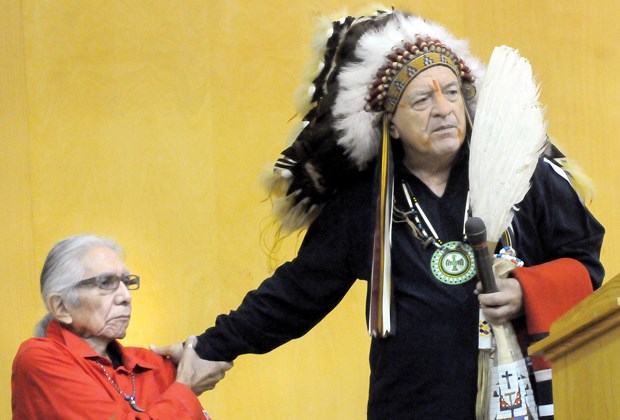Kinder Morgan's pipeline expansion is illegal - under Coast Salish law.
The Tsleil-Waututh and First Nations from Vancouver Island and Washington State met Sunday to sign a treaty that aims to put a stopper on Kinder Morgan's proposed pipeline.
If approved by the NEB and federal cabinet, Kinder Morgan's pipeline - which runs from Edmonton to Burnaby - will nearly triple its capacity, going from 300,000 to 890,000 barrels of diluted bitumen per day. Traffic in Burrard Inlet would jump from five tankers each month to 34.
"When we look at Kinder Morgan, they're breaking our laws," said Tsleil-Waututh Nation spokesman Rueben George. "In creating this treaty, we believe we've blocked all directions of the proposed pipelines."
The catalyst for the treaty - which forbids increased oil transport through Burrard Inlet - was the fear of rising cancer rates near the Alberta oil sands. "I've seen with my own eyes some of our relations that live there," George said, describing trepidation over drinking water and an elk with "a cancerous cyst the size of a baseball."
While causation is unproven, working in the oil sands and eating local food, especially fish, is associated with an increase in occurrences of cancer, according to a study released by University of Manitoba researchers and Athabasca Chipewyan First Nations in July. "The results of this study. .. should function as a dramatic wake up call to industry, government and communities alike," stated University of Manitoba
environment and geography professor Stephane McLachlan in a release.
In March, Alberta's chief medical officer Dr. James Talbot found the cancer rate in northern Alberta community Fort Chipewyan only slightly higher than expected. There were 81 documented cases of cancer - two more than anticipated.
George is hopeful the treaty will garner more supporters through a series of town hall meetings. He drew a parallel to the Yinka Dene Save the Fraser Declaration, which found increasing support in its attempt to ban pipelines through First Nation territories in the Fraser River watershed. When asked what the treaty is designed to accomplish, George replied: "Solidarity between our nations."
The treaty is meant to force Canada's political leaders to protect indigenous
laws. "Because they're not standing up for the Canadian people and the people of Vancouver, we will. Our actions are for everybody," he said. "When anything we love is hurting, we as a nation want to stand up and say 'No.'" The Tsleil-Waututh Nation is scheduled to offer oral testimony to the National Energy Board Oct. 16, according to Tsleil-
Waututh spokeswoman Sarah Thomas. The nation is also attempting to kibosh the pipeline through the Federal Court of Appeal. The Tsleil-Waututh is alleging the NEB had no legal authority to begin their review given that the federal government failed to engage the band. While no court date has been set, the band's letter of appeal has been accepted, according to Thomas.



